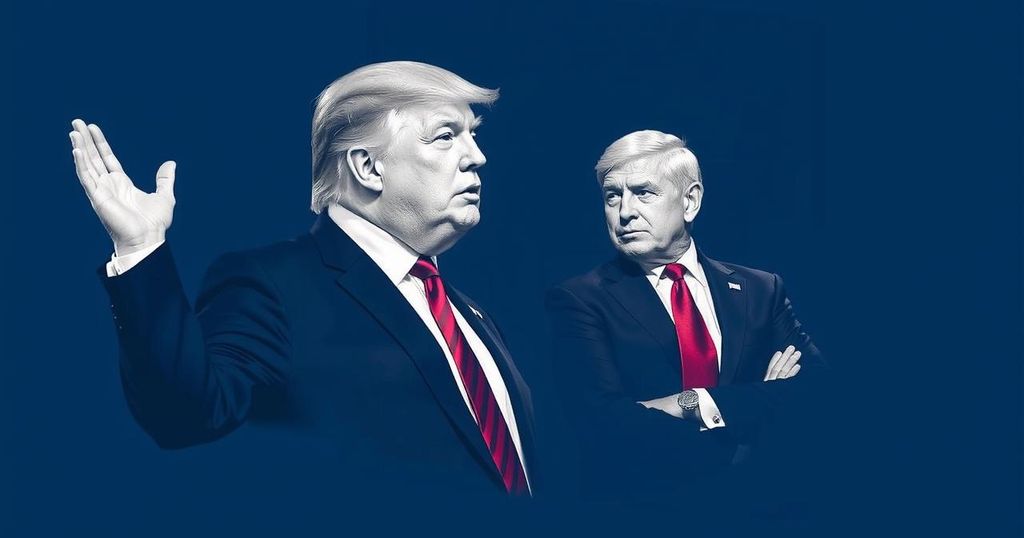World news
2024 PRESIDENTIAL ELECTION, AMERICA, ASIA, BIDEN, CHRIS DEVINE, DEMOCRATIC PARTY, DEMOCRATS, ELECTION, GOP, JOE BIDEN, MEXICO, NORTH AMERICA, PEW RESEARCH CENTER, PHILIPPINES, PRESIDENTIAL CAMPAIGN, REPUBLICAN PARTY, TNND, TRUMP, U. S, U.S. ELECTIONS, UNITED STATES, UNIVERSITY OF DAYTON, US ELECTIONS, WASHINGTON
Daniel O'Connor
0 Comments
Republicans Gain Ground as Democrats Assess Post-Election Challenges
Recent polls reveal a significant shift favoring Republicans, with 50% of Americans affirming their representation by the GOP, compared to only 43% for Democrats. This decline signals critical challenges for Democrats in maintaining their coalition. Trump’s messaging continues to attract voters, reflecting dissatisfaction with the current administration, as both parties reassess their strategies to strengthen voter loyalty ahead of the new administration’s policies.
Recent polling indicates a shift in voter sentiment, with the Republican Party, led by President-elect Donald Trump, gaining an edge in perceived representation among voters. For the first time since 2016, 50% of Americans believe the Republican Party aligns with their interests to some degree, while only 43% feel the same about the Democrats. This decrease marks the first time in eight years that Democrats have fallen short in this measure, raising alarms within the party regarding their coalition’s stability and future direction.
Post-election analysis shows that Trump’s campaign themes of economic reform, tax cuts, and immigration control have resonated with a wide range of voters, including those who traditionally supported Democrats. Despite this, the support for Trump’s agenda is not uniformly high among the broader electorate. As Democrats reflect on their losses, there is an urgent need for introspection regarding their strategy and outreach, particularly to working-class voters who have shifted towards Trump.
The Democrats face significant challenges in formulating a strategy to rebuild their electoral base following losses in the recent elections. With President Biden’s approval ratings taking a hit after the debate against Trump, and increasing concerns about his age, the party must consider how to regain trust among its varied constituencies. The dynamics have highlighted the necessity for cohesive messaging that can unite different factions, particularly as Republicans feel emboldened by their recent victories.
Scholarly perspectives suggest that the Democratic Party’s struggles are not merely fluctuations but indicative of deeper, long-standing issues within their coalition. Political expert Chris Devine notes that the true test of political support will not emerge until the new administration has enacted its policies, prompting voters to evaluate their satisfaction with the outcomes. He emphasizes that voter loyalties are notoriously unpredictable, posing a continual challenge for both major parties as they attempt to solidify their support among the electorate.
In the context of U.S. politics, parties constantly strive to connect with voters and maintain robust coalitions. After Donald Trump assumed leadership of the Republican Party in 2016, the dynamics shifted, notably as the party faced challenges under President Biden’s administration. The recent election results have prompted a reassessment from both parties on how to address their respective bases’ concerns and reshape their narratives to appeal to a wider audience. The Republican Party has marked gains in demographic segments traditionally aligned with Democrats, prompting urgent introspection within the latter regarding their long-term strategies and electoral viability.
The results of the November 5 elections underscore a significant moment in American politics, suggesting a potential realignment in voter preferences. While Republicans gain traction under Trump’s leadership, Democrats confront structural challenges in maintaining a united front among their diverse voter base. Moving forward, both parties must transcend the immediate electoral outcomes and focus on broader strategies that resonate with their constituents’ evolving priorities. As political landscapes shift, the success of any party will hinge on their adaptability to voter sentiments and preferences.
Original Source: wgxa.tv




Post Comment